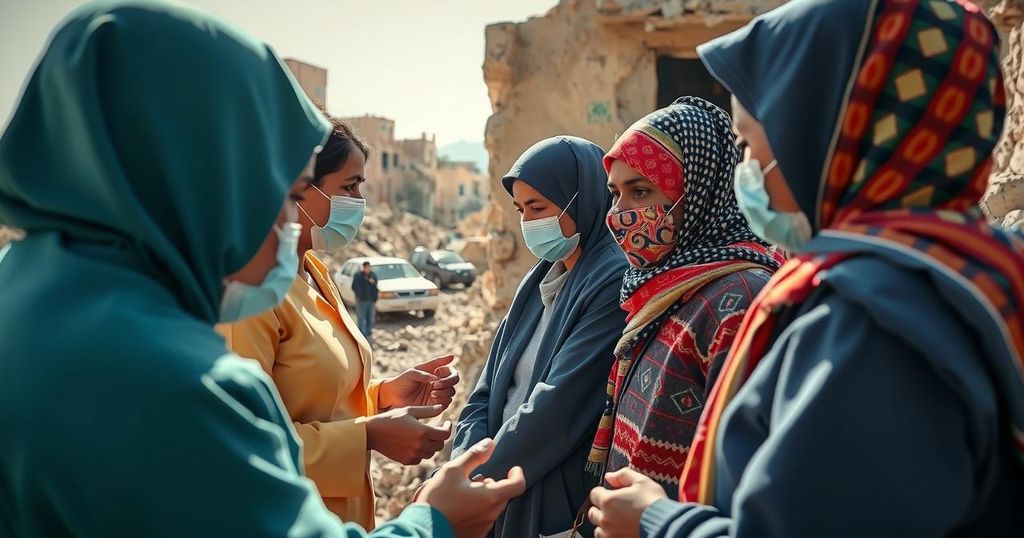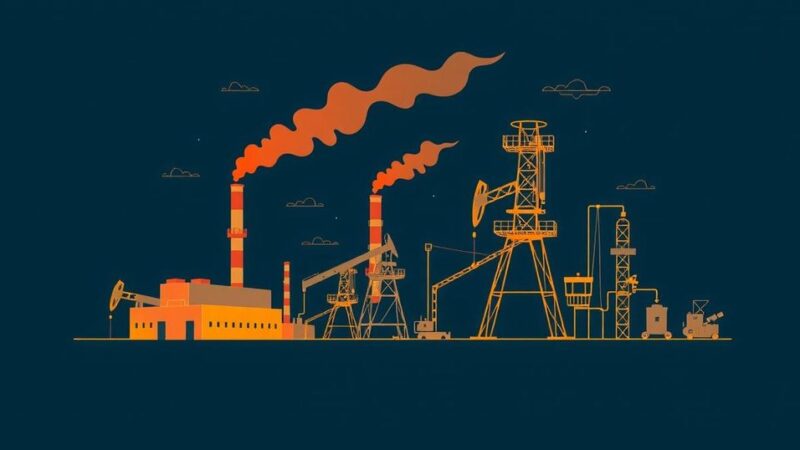In September 2023, a magnitude 6.8 earthquake devastated Morocco, particularly impacting rural areas in the Atlas Mountains and affecting vulnerable populations, especially pregnant women. In response, midwives from AMSF, supported by ICM and funded by Direct Relief, provided critical healthcare services through mobile clinics, addressing both physical and psychological needs. Their efforts included health screenings, educational sessions, and distribution of essential supplies. As the recovery continues, plans are underway to equip midwives for future crises through enhanced training programs, emphasizing their vital role in disaster response and community health.
In September 2023, Morocco experienced a catastrophic earthquake, registering a magnitude of 6.8 and leading to severe devastation, particularly in the rural areas of the Atlas Mountains. This disaster resulted in the loss of more than 2,900 lives and injured over 5,500 individuals, with pregnant women among the most affected, facing both the loss of their homes and significant health risks in the aftermath. In response to this crisis, midwives from the Association Marocaine des Sages-Femmes (AMSF), with the support of the International Confederation of Midwives (ICM), mobilized to deliver essential healthcare and support to those impacted. Utilizing funding from Direct Relief, AMSF launched five medical caravans operating in the severely affected regions, including Saidate, Tighdouine, Zerkten, Onein, and Timzdagiouine. A notable sixth caravan, facilitated in partnership with ICM, reached Ouirgane—a rural area requiring urgent assistance. On January 13, 2024, AMSF midwives, collaborating alongside physicians and nurses, established a mobile clinic in Ouirgane. Over the course of one day, the healthcare team successfully provided vital services to 169 individuals, including prenatal care, general medical consultations, and screenings for various health conditions such as HIV, diabetes, and hypertension. They also conducted ultrasounds to monitor fetal well-being and offered educational workshops covering topics such as family planning, nutrition, and breastfeeding. Additionally, the team distributed 140 dignity kits, 10 newborn kits, and winter clothing to at-risk families affected by the disaster. For individuals requiring more specialized medical attention, the midwives effectively coordinated referrals to higher-level health facilities, including Marrakech University Hospital, to ensure comprehensive follow-up care. Beyond physical health services, midwives also attended to the psychological needs of women grappling with the trauma of the earthquake. They facilitated both individual and group sessions aimed at addressing mental health challenges. Furthermore, women who had suffered from gender-based violence received targeted coaching and support, underlining the compassionate, multifaceted role midwives play in their communities. Despite significant obstacles in accessing remote areas due to compromised health centers, AMSF midwives exercised their established connections within local networks to persistently reach the communities in need. Looking toward the future, AMSF and ICM are proactively preparing to enhance the capabilities of midwives for future emergencies. AMSF has emphasized the need for additional training, which ICM is addressing through the development of the “Ready to Respond: A Midwife’s Guide to Humanitarian Action” program. This initiative aims to equip midwives with the necessary skills and knowledge to effectively respond to humanitarian crises, encompassing disaster management and the provision of respectful maternity care in such settings. In May 2024, ICM hosted a three-day “Train the Trainer” (ToT) program in Rabat, where AMSF midwives were instructed on assessing needs in crises, managing newborn care during emergencies, and advocating for the critical inclusion of midwives in national emergency response strategies. The training aims to strengthen the capacity of midwives to safeguard public health and advocate for more robust, inclusive health systems during future emergencies. The collaboration between Direct Relief, ICM, and AMSF exemplifies the essential leadership of midwives amid crises. As communities affected by the earthquake embark on the road to recovery, the unwavering commitment of these midwives continues to inspire by not only delivering midwifery care but also offering hope and stability to their communities. The enduring legacy of their service is poignantly captured in a forthcoming video detailing the caravan’s activities in Ouirgane, reflecting the resilience and bravery demonstrated during these challenging times.
The morning of September 8, 2023, marked a devastating natural disaster for Morocco when a powerful earthquake of magnitude 6.8 struck near the High Atlas Mountains. The quake disproportionately impacted rural communities, decimating infrastructure, causing significant casualties, and complicating health and safety for individuals, particularly pregnant women and vulnerable populations. The aftermath of such disasters often leaves affected individuals grappling not only with health risks but also mental health struggles amidst loss and turmoil. In this context, midwives play a critical role in providing both physical and emotional support as communities seek to recover and rebuild.
The case of midwives supporting earthquake-affected communities in Morocco illustrates the critical role health professionals play in disaster relief efforts. Their swift response, encompassing both medical assistance and psychological support, demonstrates the profound impact midwives have on their communities during crises. The ongoing efforts to train and prepare midwives for future emergencies highlight the necessity of investing in healthcare systems that can effectively respond to humanitarian needs, ensuring the well-being and care of all community members during challenging times.
Original Source: internationalmidwives.org






